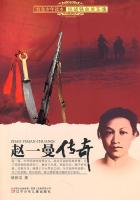I have often pictured myself on that journey.I was twenty-one years of age, though one would have called me older.My looks were nothing to boast of, and I was grown up tall and weedy, so that I must have made quite a comical sight, with my long legs dangling on either side of the pony.I wore a suit of gray homespun, and in my saddle-bags I carried four precious law books, the stock in trade which my generous patron had given me.
But as I mounted the slopes of the mountains my spirits rose too at the prospect of the life before me.The woods were all aflame with color, with wine and amber and gold, and the hills wore the misty mantle of shadowy blue so dear to my youthful memory.As I left the rude taverns of a morning and jogged along the heights, I watched the vapors rise and troll away from the valleys far beneath, and saw great flocks of ducks and swans and cackling geese darkening the air in their southward flight.Strange that I fell in with no company, for the trail leading into the Tennessee country was widened and broadened beyond belief, and everywhere I came upon blackened fires and abandoned lean-tos, and refuse bones gnawed by the wolves and bleached by the weather.I slept in some of these lean-tos, with my fire going brightly, indifferent to the howl of wolves in chase or the scream of a panther pouncing on its prey.For I was born of the wilderness.
It had no terrors for me, nor did I ever feel alone.The great cliffs with their clinging, gnarled trees, the vast mountains clothed in the motley colors of the autumn, the sweet and smoky smell of the Indian summer,--all were dear to me.
As I drew near to Jonesboro my thoughts began to dwell upon that strange and fascinating man who had entertained Polly Ann and Tom and me so lavishly on our way to Kentucky,--Captain John Sevier.For he had made a great noise in the world since then, and the wrath of such men as my late patron was heavy upon him.
Yes, John Sevier, Nollichucky Jack, had been a king in all but name since I had seen him, the head of such a principality as stirred the blood to read about.It comprised the Watauga settlement among the mountains of what is now Tennessee, and was called prosaically (as is the wont of the Anglo-Saxon) the free State of Franklin.There were certain conservative and unimaginative souls in this mountain principality who for various reasons held their old allegiance to the State of North Carolina.One Colonel Tipton led these loyalist forces, and armed partisans of either side had for some years ridden up and down the length of the land, burning and pillaging and slaying.We in Virginia had heard of two sets of courts in Franklin, of two sets of legislators.
But of late the rumor had grown persistently that Nollichucky Jack was now a kind of fugitive, and that he had passed the summer pleasantly enough fighting Indians in the vicinity of Nick-a-jack Cave.
It was court day as I rode into the little town of Jonesboro, the air sparkling like a blue diamond over the mountain crests, and I drew deep into my lungs once more the scent of the frontier life I had loved so well.
In the streets currents of excited men flowed and backed and eddied, backwoodsmen and farmers in the familiar hunting shirts of hide or homespun, and lawyers in dress less rude.A line of horses stood kicking and switching their tails in front of the log tavern, rough carts and wagons had been left here and there with their poles on the ground, and between these, piles of skins were heaped up and bags of corn and grain.The log meeting-house was deserted, but the court-house was the centre of such a swirling crowd as I had often seen at Harrodstown.
Now there are brawls and brawls, and I should have thought with shame of my Kentucky bringing-up had Inot perceived that this was no ordinary court day, and that an unusual excitement was in the wind.
Tying my horse, and making my way through the press in front of the tavern door, I entered the common room, and found it stifling, brawling and drinking going on apace.Scarce had I found a seat before the whole room was emptied by one consent, all crowding out of the door after two men who began a rough-and-tumble fight in the street.I had seen rough-and-tumble fights in Kentucky, and if I have forborne to speak of them it is because there always has been within me a loathing for them.And so I sat quietly in the common room until the landlord came.
I asked him if he could direct me to Mr.Wright's house, as I had a letter for that gentleman.His answer was to grin at me incredulously.
``I reckoned you wah'nt from these parts,'' said he.
``Wright's-out o' town.''
``What is the excitement?'' I demanded.
He stared at me.
``Nollichucky Jack's been heah, in Jonesboro, young man,'' said he.
``What,'' I exclaimed, ``Colonel Sevier?''
``Ay, Sevier,'' he repeated.``With Martin and Tipton and all the Caroliny men right heah, having a council of mility officers in the court-house, in rides Jack with his frontier boys like a whirlwind.He bean't afeard of 'em, and a bench warrant out ag'in him for high treason.
Never seed sech a recklessness.Never had sech a jamboree sence I kept the tavern.They was in this here room most of the day, and they was five fights before they set down to dinner.''
``And Colonel Tipton?'' I said.
``Oh, Tipton,'' said he, ``he hain't afeard neither, but he hain't got men enough.''
``And where is Sevier now?'' I demanded.
``How long hev you ben in town?'' was his answer.
I told him.
``Wal,'' said he, shifting his tobacco from one sallow cheek to the other, ``I reckon he and his boys rud out just afore you come in.Mark me,'' he added, ``when Itell ye there'll be trouble yet.Tipton and Martin and the Caroliny folks is burnin' mad with Chucky Jack for the murder of Corn Tassel and other peaceful chiefs.But Jack hez a wild lot with him,--some of the Nollichucky Cave traders, and there's one young lad that looks like he was a gentleman once.I reckon Jack himself wouldn't like to get into a fight with him.He's a wild one.















